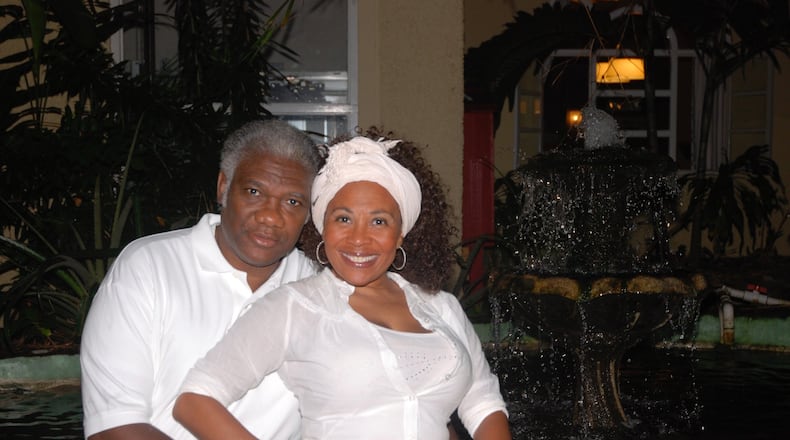Rushia Stephens was a musician and a teacher and a helper, the type of woman that cast a positive spell on everyone that crossed her path — family, friends, folks she only met once or twice.
She was unfailingly positive and impossibly energetic, active in her church, her sorority and a little bit of everything else.
She tried retirement more than once but found it didn’t suit her.
“The word I would use is vivacious,” family friend Tanya Washington said. “Just warm and real. And just so youthful and vibrant and exuberant.”
Rushia Stephens died last week, an apparent victim of COVID-19, the disease caused by the new coronavirus that's spread across Georgia, the United States and the world.
She was 65.
A beloved music teacher in Atlanta and DeKalb County schools, Stephens touched thousands of lives and inspired scores of students who went on to pursue careers in the arts.
She left behind an untold number of admirers, a mother and two younger brothers. She left behind two children and two step-children (though she’d balk at the distinction), as well as three grandsons.
She also left behind her husband and best friend of 20 years.
Corneill Stephens, a former DeKalb County magistrate judge and longtime law professor at Georgia State University, is now left to mourn in isolation, quarantined in his son’s home and walled off from loved ones while he awaits his own test results.
“I feel lost and adrift,” he said Thursday. “It’s like I’m in the middle of the ocean on a sheet of plywood, looking up.”
Rushia Stephens assumed her seasonal allergies had given her a sinus infection and a slight fever, so she went to her ear, nose and throat specialist. That doctor told her to go to the hospital to get tested for coronavirus.
Stephens always ate healthy and exercised — and tried to get her husband to do the same — but older people are believed to be more susceptible to the virus’ whims.
So she went to the hospital that day and sat in a room with other folks awaiting testing for nine or 10 hours, her husband said. They ultimately sent her home without a test because her symptoms weren’t severe enough — a decision health care workers in Georgia and elsewhere are forced to make every day due to a shortage of tests.
They told her to come back if she started having respiratory issues.
Rushia Stephens was born to a schoolteacher mother and a father, Cleopas R. Johnson, who would become famous for leading the Morris Brown College marching band.
She was one of the first black students to attend what was then the Northside School of Performing Arts and went on to study at Ithaca School of the Arts in New York. She sang alto soprano and performed in the theater.
After graduation, she returned home and taught music for years at her alma mater, which became North Atlanta High School. She got a master’s degree in music education. She retired, then went back to teaching music at Montclair Elementary School in DeKalb, organizing plays and musical performances for a much younger group of students.
“She just loved her babies,” her husband said.
Stephens eventually “retired” again, then started a summer program to teach kids about the arts. About three years ago, she took a job as a records technician in the DeKalb County Clerk of Superior Court’s Office.
“We loved her, we’re grieving for her, and we’re praying for her family,” clerk Debra DeBerry said.
Within a few days of her initial hospital visit, Stephens developed a cough. On March 17, she started breathing “a little bit heavy,” her husband said.
Two days later, with the symptoms persisting, Corneill Stephens decided to call the hospital. While he was on hold, Rushia said she felt like she should go to the emergency room.
They called an ambulance and it took her to Emory Hillandale Hospital, where she was immediately sedated and intubated. But within an hour she was gone.
Family said her COVID-19 diagnosis was confirmed this week.
Rushia Stephens will be memorialized Saturday afternoon at the Murray Brothers Funeral Home near Cascade Road. Only a small handful of family members will attend, with other mourners forced to watch online. Such is life — and death — during a pandemic.
Corneill Stephens will be among those watching from afar, still quarantined alone in his son’s home. He’s struggling, living “in a time warp.” But he’s taking his isolation seriously.
He hopes folks on the outside are taking care, too.
With more than 85,000, the United States now has the most confirmed coronavirus cases in the world.
As of lunchtime Friday, Georgia had confirmed 2,001 cases of the virus and 566 people had been hospitalized. Sixty-four people had died.
But those are just numbers.
“They don’t accurately express the impact it has when it’s touched someone that you love,” Corneill Stephens said.
About the Author
Keep Reading
The Latest
Featured





